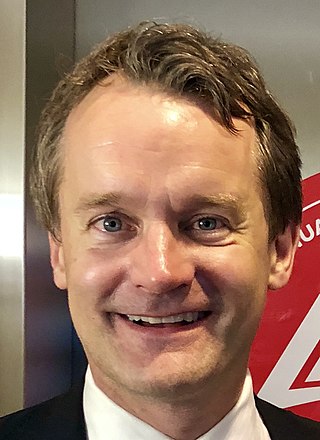Related Research Articles

The prime minister of Canada is the head of government of Canada. Not outlined in any constitutional document, the office exists only per long-established convention. Under the Westminster system, the prime minister governs with the confidence of a majority of the elected House of Commons; as such, the prime minister typically sits as a member of Parliament (MP) and leads the largest party or a coalition of parties. The prime minister is appointed by the monarch's representative, the governor general, and, as first minister, selects other ministers to form the Cabinet and chairs it. Constitutionally, executive authority is vested in the monarch, but, in practice, the powers of the monarch and governor general are nearly always exercised on the advice of the Cabinet, which is collectively responsible to the House of Commons. Canadian prime ministers are appointed to the Privy Council and styled as the Right Honourable, a privilege maintained for life.

William Lyon Mackenzie King was a Canadian statesman and politician who served as the tenth prime minister of Canada for three non-consecutive terms from 1921 to 1926, 1926 to 1930, and 1935 to 1948. A Liberal, he was the dominant politician in Canada from the early 1920s to the late 1940s. King is best known for his leadership of Canada throughout the Great Depression and the Second World War. He played a major role in laying the foundations of the Canadian welfare state and established Canada's international reputation as a middle power fully committed to world order. With a total of 21 years and 154 days in office, he remains the longest-serving prime minister in Canadian history.

The history of Canada covers the period from the arrival of the Paleo-Indians to North America thousands of years ago to the present day. The lands encompassing present-day Canada have been inhabited for millennia by Indigenous peoples, with distinct trade networks, spiritual beliefs, and styles of social organization. Some of these older civilizations had long faded by the time of the first European arrivals and have been discovered through archeological investigations.

The Liberal Party of Canada is a federal political party in Canada. The party espouses the principles of liberalism, and generally sits at the centre to centre-left of the Canadian political spectrum, with their main rival, the Conservative Party, positioned to their right and the New Democratic Party positioned to their left. The party is described as "big tent", practising "brokerage politics", attracting support from a broad spectrum of voters. The Liberal Party is the longest-serving and oldest active federal political party in the country, and has dominated federal politics of Canada for much of its history, holding power for almost 70 years of the 20th century. As a result, it has sometimes been referred to as Canada's "natural governing party".

Donald Grant Creighton was a Canadian historian whose major works include The Commercial Empire of the St-Lawrence, 1760–1850, a detailed study on the growth of the English merchant class in relation to the St Lawrence River in Canada. His biography of John A. Macdonald, published into two parts between 1952 and 1955, was considered by many Canadian historians as re-establishing biographies as a proper form of historical research in Canada. By the 1960s Creighton began to move towards a more general history of Canada.
Canada's contemporary theatre reflects a rich diversity of regional and cultural identities. Since the late 1960s, there has been a concerted effort to develop the voice of the 'Canadian playwright', which is reflected in the nationally focused programming of many of the country's theatres. Within this 'Canadian voice' are a plurality of perspectives - that of the First Nations, new immigrants, French Canadians, sexual minorities, etc. - and a multitude of theatre companies have been created to specifically service and support these voices.

Colm Joseph Feore is a Canadian actor. A 15-year veteran of the Stratford Festival, he is known for his Gemini-winning turn as Prime Minister Pierre Trudeau in the CBC miniseries Trudeau (2002), his portrayal of Glenn Gould in Thirty Two Short Films About Glenn Gould (1993), and for playing Detective Martin Ward in Bon Cop, Bad Cop (2006) and its sequel Bon Cop, Bad Cop 2 (2017).
The Charlottetown Festival is a seasonal Canadian musical theatre festival which runs from late May to mid-October every year since 1965.
Alexander Mackenzie Gray is a Canadian film, television, and stage actor. He is a dual citizen of the United Kingdom and Canada. He divides his time between Toronto and Vancouver.

Post-Confederation Canada (1867–1914) is history of Canada from the formation of the Dominion to the outbreak of World War I in 1914. Canada had a population of 3.5 million, residing in the large expanse from Cape Breton to just beyond the Great Lakes, usually within a hundred miles or so of the Canada–United States border. One in three Canadians was French, and about 100,000 were aboriginal. It was a rural country composed of small farms. With a population of 115,000, Montreal was the largest city, followed by Toronto and Quebec at about 60,000. Pigs roamed the muddy streets of Ottawa, the small new national capital.

This is a bibliography of major works on the History of Canada.
John Richard English is a Canadian academic and former politician.
Billy Bishop Goes to War is a Canadian musical, written by John MacLachlan Gray in collaboration with the actor Eric Peterson. One of the most widely produced plays in Canadian theatre, the two-man play dramatizes the life of Canadian World War I fighter pilot Billy Bishop. One member of the cast plays the part of Bishop in word and song, although he is also called upon to dramatize 17 other parts; the second cast member provides all the accompaniment on the piano and also sings.

The minister of Labour is the minister of the Crown in the Canadian Cabinet who is responsible for the labour portfolio of Employment and Social Development Canada. From 2015 to 2019, the portfolio was included in that of the Minister of Employment, Workforce Development and Labour, but was split in 2019 during the government of Justin Trudeau.
Margaret Hollingsworth is a Canadian writer. Best known as a playwright, she has also published a novel and short stories.
Astrid Janson is a Canadian set designer and costume designer. Best known for her work in theatre, she has also designed for television, opera, dance, film and exhibitions.
The foreign policies of Canada and its predecessor colonies were under British control until the 20th century. This included wars with the United States in 1775-1783 and 1812–1815. Economic ties with the U.S. were always close. Political tensions arose in the 19th century from anti-British feeling in the U.S. in the 1860s. Boundary issues caused diplomatic disputes resolved in the 1840s over the Maine boundary. and early 1900s, in the early 20th century over the Alaska boundary. There is ongoing discussion regarding the Arctic. Relations have been very friendly with the U.S. in the 20th and 21st centuries.

Deanne Taylor was a Canadian actress, artist, and performer. At 9 years old, she starred in the television program Maggie Muggins. In 1982, she ran for mayor in the 1982 Toronto municipal election, under the pseudonym A. Hummer placing 2nd, against Art Eggleton. Together with husband Michael Hollingsworth, she founded theatre company VideoCabaret, creating several plays about the history of Canada. She is credited with creating a novel genre of 'stand-up journalism', and contributing to the culture of Toronto, Canada.
Cliff Cardinal is a Cree and Lakota actor and playwright from Toronto, Ontario, most noted for his one-man show The Land Acknowledgement, or As You Like It.
References
- ↑ Gabrielle H. Cody and Evert Sprinchorn, The Columbia Encyclopedia of Modern Drama, Volume 1 (p. 622). Columbia University Press, 2007. ISBN 978-0231140324.
- 1 2 3 4 5 6 7 Michael Hollingsworth at The Canadian Encyclopedia.